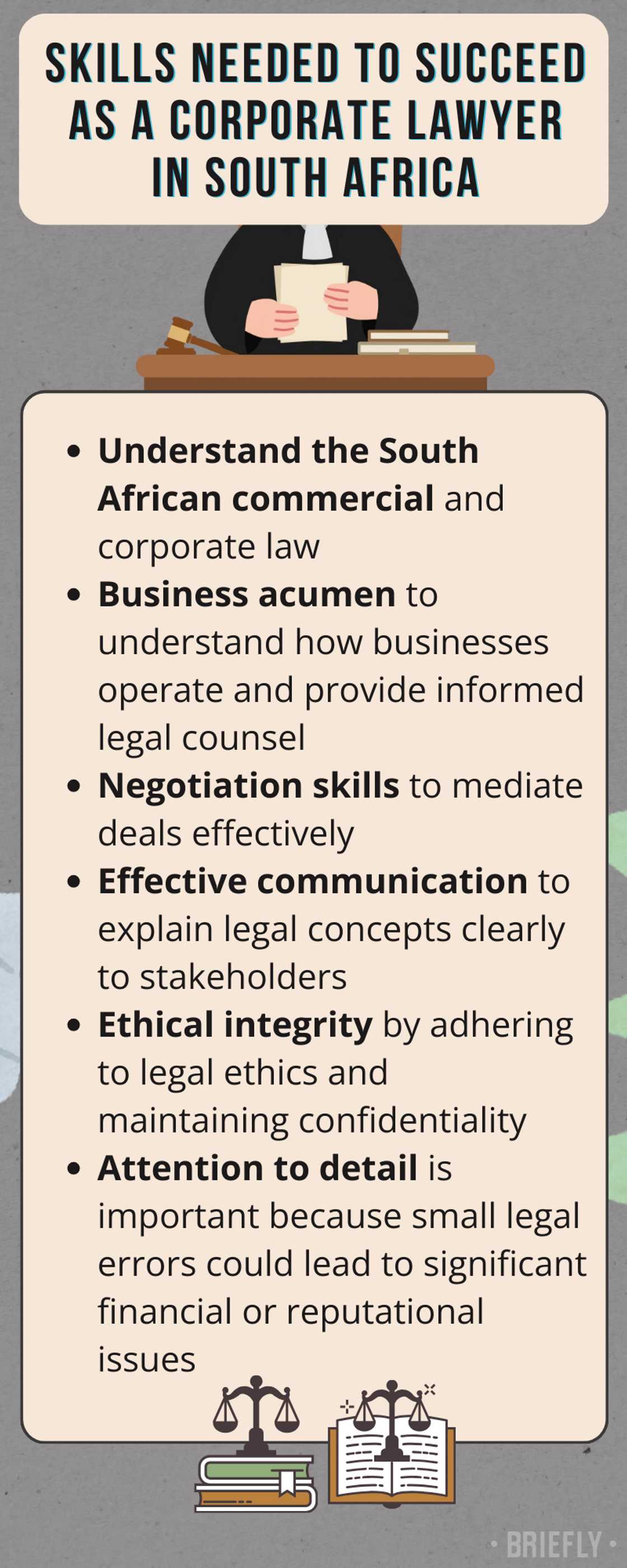Corporate lawyer salary in SA: how much do they earn and what do they do?
The average corporate lawyer's salary in South Africa is estimated to be R24,700 per month, with established professionals earning over R80,000 per month. They help businesses navigate the legal landscape with legal counsel on mergers and acquisitions, compliance, and contracts.

Source: Getty Images
TABLE OF CONTENTS
Key takeaways
- A corporate lawyer's salary starts at around R29,000 per year at the entry level and exceeds R900,000 per year at senior levels.
- Their core responsibilities include offering legal advice, ensuring compliance with the law, and managing risk to avoid costly litigation.
- Most corporate lawyers work in law firms and offer their services to various companies, while others are employed by companies as in-house corporate counsel.
How much does a corporate lawyer earn in SA?
A corporate lawyer's salary per month ranges from R2,400 (approx. R29,000 per year) at the entry level to over R82,700 (approx. R993,000 per year), according to Payscale. The median salary is estimated to be R24,700 (approx. R297,000 per year).

Read also
"SA needs to do better": Woman shares the R22k minimum wage for any job in Korea, SA stunned
The professionals also earn bonuses, which vary with the company they work for. At the highest level, corporate lawyer bonuses can exceed R339,000 per year.

Source: Getty Images
What does a corporate lawyer do for a company?
Corporate lawyers advise and represent businesses on various legal matters to minimise legal risk. They can be part of a major law firm that deals with corporate clients or be employed directly by the company for in-house legal counsel. A corporate lawyer's job description features these key duties:
- Advising companies on their legal rights and duties
- Overseeing mergers and acquisitions by structuring deals and drafting agreements
- Drafting and negotiating contracts: A large portion of a corporate lawyer's responsibilities is working on contracts on behalf of their clients. The agreements range from simple leases to billion-rand deals.
- Corporate formation and governance: Draft a new company's foundational documents and advise corporate governance on how to maintain legal and ethical practices.
- Assisting in venture capital and securities: Oversee fundraising, stock issuance, and compliance with securities laws to prevent insider trading or fraud.
- Ensuring regulatory compliance: Ensure the company does not violate laws relating to securities law, intellectual property, labour and employment law.
- Conduct risk assessment and mitigation: Identify potential legal risks for a company and develop strategies to mitigate them and prevent potential disputes or lawsuits.

Read also
SASSA suspends 70,000 payments as corruption clampdown intensifies, citizens points to internal rot

Source: Getty Images
How to become a corporate lawyer in South Africa
To become a corporate attorney in Mzansi, you must have a law degree, complete practical training, pass the bar exams, and then register with the LPC. You will specialise with practical experience and post-graduate studies.
1. Obtain a law degree
Pursuing a 4-year Bachelor of Laws (LLB) degree from accredited SA universities is the first step in achieving your corporate lawyer requirements. It offers foundational knowledge in various fields of law. You can also start with a BCom Law or BA Law, then complete with a shorter 2-year LLB program.
Pursuing BCom Law is a beneficial route for aspiring corporate attorneys as it offers a strong foundation in business-related subjects. South Africa has several top universities for corporate law, including:
- University of Cape Town
- University of the Witwatersrand
- University of Pretoria
- Stellenbosch University
- University of Johannesburg

Read also
“It’s nothing, bro”: Man reveals senior Java developer payslip, SA reacts to tech industry earnings

Source: Getty Images
2. Complete Articles of Clerkship
After getting your LLB, you must complete a two-year Articles of Clerkship or Practical Vocational Training (PVT) at a law firm or legal institution. You will work as a candidate attorney under the supervision of a professional lawyer.
You can also complete a Practical Legal Training (PLT) course alongside your articles for more practical experience. PLT courses are usually provided by institutions like the Law Society of South Africa.
3. Pass the bar exam
Candidate attorneys must pass the Attorney's Admission Examination administered by the Legal Practice Council (LPC) before they can be admitted as legal practitioners. You can then apply for admission as an attorney with the High Court. After being admitted, you must register with the LPC to be allowed to practice law in South Africa.
4. Specialise in corporate law
Seek practical training at law firms that specialise in corporate or commercial law. You can later deepen your expertise by pursuing a Master of Laws (LLM) in Corporate Law, which will help you understand fields like tax law and intellectual property law.

Source: Getty Images
Skills needed to succeed as a corporate lawyer in South Africa
A good corporate lawyer needs to have legal expertise, business acumen, and interpersonal skills. Key attributes to have include:
- Understand the South African commercial and corporate law
- Business acumen to understand how businesses operate and provide informed legal counsel
- Negotiation skills to mediate deals effectively
- Effective communication to explain legal concepts clearly to stakeholders
- Ethical integrity by adhering to legal ethics and maintaining confidentiality
- Attention to detail is important because small legal errors could lead to significant financial or reputational issues
Are corporate lawyers in demand in South Africa?
Experienced corporate lawyers are some of the most sought-after lawyers in South Africa as the country's economy continues to grow. The demand is concentrated in major economic hubs like Johannesburg, Cape Town, and Pretoria, where most large companies and law firms are situated.

Source: Getty Images
Final word
A corporate lawyer's salary in South Africa places it among the country's lucrative professions. You will start with modest pay at the entry level, but earnings are expected to grow as you rise to become a senior partner at a firm or an in-house legal counsel for a major corporation.

Source: Original
DISCLAIMER: This article is not sponsored by any third party. It is intended for general informational purposes only and does not address individual circumstances. It is not a substitute for professional advice or help and should not be relied on to make decisions of any kind. Any action you take upon the information presented in this article is strictly at your own risk and responsibility!
READ MORE: How many years to study law in South Africa? A complete guide
Briefly.co.za published a post about how long it takes to study law in South Africa. The minimum qualification to practice is an LLB, which typically takes about four years of full-time study at top SA universities.
Aspiring lawyers may pursue an LLM, which takes about one year for full-time students. You will also need about two years for Articles of Clerkship, and you must pass the board exams set by the Legal Practice Council to become a practising attorney.
Source: Briefly News



